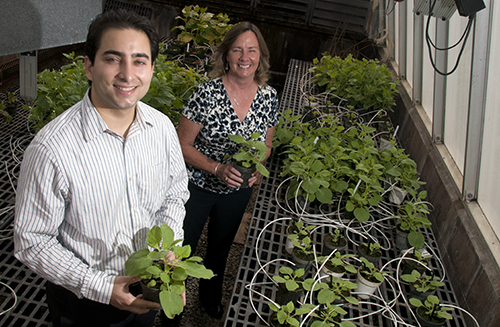Producing Plant-Based Medical Treatments

Karen McDonald is a professor in the Department of Chemical Engineering and Materials Science at UC Davis. Her research, which uses plants to produce recombinant proteins, has |the potential to revolutionize how biofuels, vaccines and pharmaceuticals are manufactured.
McDonald has demonstrated that plant-based production is an attractive alternative manufacturing platform for biopharmaceuticals. Advantages for large-scale protein production include lower production costs, scalability, and low risk of contamination by mammalian viruses, pathogens, or bacterial toxins.
As an example, her team is transforming tobacco plants into living factories for making new vaccines and medical treatments. The technology can be easily customized to produce not only vaccines, but other high-value proteins, including therapeutics for rare (orphan) diseases. McDonald has received technology commercialization grants from the National Science Foundation and VentureWell.
In 2013, she cofounded Inserogen, whose name is derived from the Latin for “to plant a gene,” with Lucas Arzola, who was a doctoral candidate at the time. Together, they plan to commercialize the use of tobacco plants as a rapid, scalable, and cost-effective manufacturing platform for production of therapeutics for rare diseases. Inserogen won first prize in the 2010 Big Bang! business plan competition at UC Davis. The company was selected in 2014 to be one of the first members of the UC Davis-HM.CLAUSE Life Science Innovation Center through the Venture Catalyst DRIVE program.

